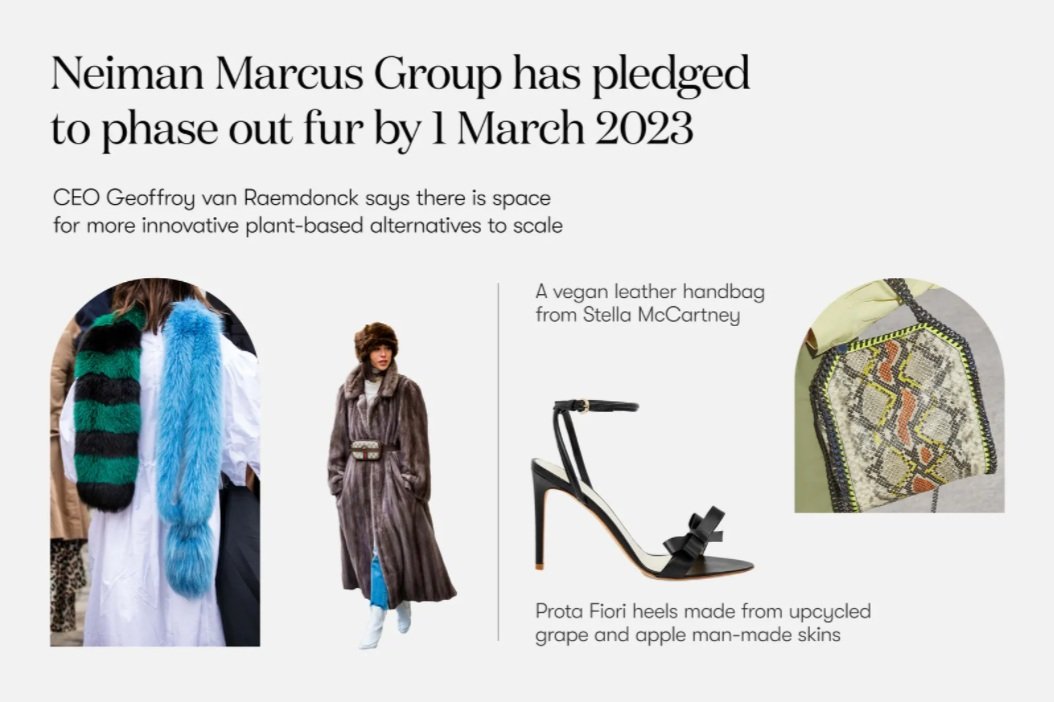The US retailer is one of many phasing out fur products. CEO Geoffroy van Raemdonck says the future lies in plant-based alternatives.
–
Move over mink – apple leather is the future of sustainable luxury. So says US retailer Neiman Marcus Group (NMG), one of America’s most storied fur sellers, which pledged to phase out animal fur last June and will stop selling it entirely from March 2023.
CEO Geoffroy van Raemdonck, speaking exclusively to Vogue Business, says the group has already halved its fur inventory, which traditionally skews towards outerwear and accessories. He declined to comment on the financial significance of ending NMG’s fur operations, but described it as “a small but real part of our business that touched a lot of our loyal customers”. He says the company is keen to prove to those customers that they are “replacing something, not taking something away”.
Alongside its animal fur offering — ranging from a £28 Gorski fur scrunchie to a £169,000 Oscar de la Renta sable coat — the group now offers a host of faux fur options, including a $5,900 Burberry jacket and Badgley Mischka outerwear starting from $200. The retailer is ready to supercharge the brands that develop the best alternatives. Finding scalable plant-based materials that match the quality and feel of animal products is posing a significant challenge, as is bringing along on the journey brands and consumers, particularly its most loyal, high-spending clients.
NMG says fur sales have been declining in recent years. Consumer sentiment is shifting while new legislation has come into play. California was the first US state to ban the sale of new fur products in 2019, a change which comes into effect in 2023. Cities in Massachusetts, Michigan and Florida have passed similar legislation.
COURTESY OF NEIMAN MARCUS GROUP, CLAUDIO LAVENIA VIA GETTY IMAGES. ARTWORK BY VOGUE BUSINESS
As pressure mounts, retailers have moved to distance themselves from animal fur. Macy’s and Bloomingdale’s have been fur-free since the end of 2020, while Saks Fifth Avenue will stop selling fur by the end of 2022. German e-commerce retailer Mytheresa won’t offer fur beyond Spring/Summer 2022, having already stopped buying exotic skins in Spring/Summer 2021.
Momentum has been building among brands too. The last Moncler collection to feature fur, including its signature puffer jackets, will be Autumn/Winter 2023; while fellow outdoor fashion brand Canada Goose will phase out fur before the end of 2022. French conglomerate Kering imposed a ban on fur across all its brands from Autumn/Winter 2022 onwards, building on Gucci’s pledge in 2017.
“The future of luxury is fur-free,” says New York-based retail consultant Robert Burke, pointing out that the emerging generation of luxury consumers, who grew up online, prize transparency, authenticity and ethics above all else. “Of all US retailers, NMG was probably the most steeped in the tradition of fur, so this is a very vocal and visible move for them.”
Swapping animal products for circular services
The retailer’s new focus on ESG was a fundamental part of its post-bankruptcy strategy, explains van Raemdonck. Its private investors defined a new mission — to “revolutionise luxury experiences”. This includes publishing ESG impact reports, the first of which was released this month. Moving forward, the group will audit its ESG impact the same way it audits its finances.
Alongside its fur ban, the group has committed to increasing its revenue from sustainable and ethical products by 2025. No target quota has been set, but NMG has set out a list of preferred product features and third-party certifications and will track its progress on these metrics from late 2022. NMG says it extended the life of 350,000 items in 2021 through circular fashion services including alterations, restoration and resale. The aim is to raise the number of items to one million by 2025. “Sustainability is a journey,” says van Raemdonck. “Fur is just the first step.”
NMG consumers need to be supported too. “There is an equal need to develop alternatives and to educate consumers on why they are valuable and luxurious,” says van Raemdonck. Part of this positive framing is the transformation of NMG’s 22 in-store fur salons into alterations bars and circular fashion hubs, where customers can access customisation, refurbishment and even resale, a process which is already underway. The group will continue to offer fur storage, restoration and cleaning services – to keep existing garments in circulation for as long as possible and avoid them going to landfill. Brand partners that have yet to ban fur and have asked to adopt the retailer’s fur customers have been turned away: NMG will not participate in referrals or financially benefit from fur.
Fur today, more tomorrow
When Dolce & Gabbana went fur-free in January, the Italian luxury brand promised to maintain its relationships with fur artisans, incorporating their skills and supply chains as it explored alternatives to animal fur. NMG is taking a similar approach by phasing out fur over time, allowing its brand partners to evolve in tandem and find suitable alternatives. “We didn’t want to put undue pressure on our partners’ businesses,” explains van Raemdonck. “It might have been easier for us to do this immediately, but the big win is bringing brands and customers on the journey with us.”
The hunt is on for materials to replace animal products. “We are working on finding alternative materials that give the customer the same beautiful emotional response as animal products, but in a sustainable and ethical way,” van Raemdonck says, including leather as well as fur. One challenge is finding alternatives that don’t rely on plastics. “It is an under-developed set of solutions right now, and we don’t want to solve one problem by creating another. Part of our role as a retailer is encouraging brands to develop alternatives, and exposing their solutions to our market so they can get feedback and support.”
Among the promising contenders, he highlights Stella McCartney’s ‘Koba’ plant-based faux fur — which claims to produce 63 per cent less greenhouse gas emissions than conventional synthetics and can retail upwards of £1,000 — and Prota Fiori’s upcycled grape and apple leather footwear.
The group’s new Animal Welfare Policy was devised with an animal welfare organisation, the Humane Society of the United States, which first worked with NMG over a decade ago, reviewing its fur labelling and advertising after pointing out a loophole in US federal law that allowed fur in products under $150 to be omitted from clothing labels (this has since been closed).
The conversation has moved on since then, and will continue to do so, says Humane Society fashion policy director PJ Smith. NMG’s animal welfare policy allows it to continue selling animal fabrics such as cashmere, leather, mohair, down, wool and silk, although it will continue to monitor animal welfare concerns associated with these materials. “If fashion businesses want to remain sustainable and successful, they have to adapt to the causes consumers care about,” says Smith. “NMG going fur free is a signal to the rest of the industry that moving away from fur is inevitable.”


